Key takeaways:
- Privacy advocacy emphasizes the need for individuals to control their personal information and understand their rights.
- Challenges in activism include misinformation, emotional fatigue, and team dynamics, which can hinder progress.
- Successes in activism arise from adaptability, effective storytelling, and the power of collective action.
- Future goals include amplifying underrepresented voices, fostering collaboration with tech companies, and educating youth about privacy rights.

Understanding privacy advocacy
Privacy advocacy is all about defending individuals’ rights to control their personal information in an increasingly digital world. I remember the first time I felt a breach of my own privacy—it was unsettling and made me question how secure my data truly was. Does anyone else feel that knot in their stomach when they receive targeted ads based on intimate conversations? This experience ignited my passion for advocating for stronger privacy protections.
Delving into privacy advocacy means grappling with the implications of surveillance and data collection. I often find myself pondering how much control we actually have over our digital footprints. It’s a bit disheartening, isn’t it? Every click, every interaction leaves traces that can be tracked, and recognizing that reality motivated me to engage more deeply in activism.
It’s not just about raising awareness; it’s about empowering people with knowledge. During one of my advocacy workshops, I witnessed a powerful moment when a participant realized they had the right to request their data be deleted. The look of empowerment on their face was unforgettable. How can we expect people to stand up for their privacy if they don’t even know they have the right to fight for it? Understanding privacy advocacy is as much about education as it is about activism, and both are crucial in this ongoing battle for our rights.
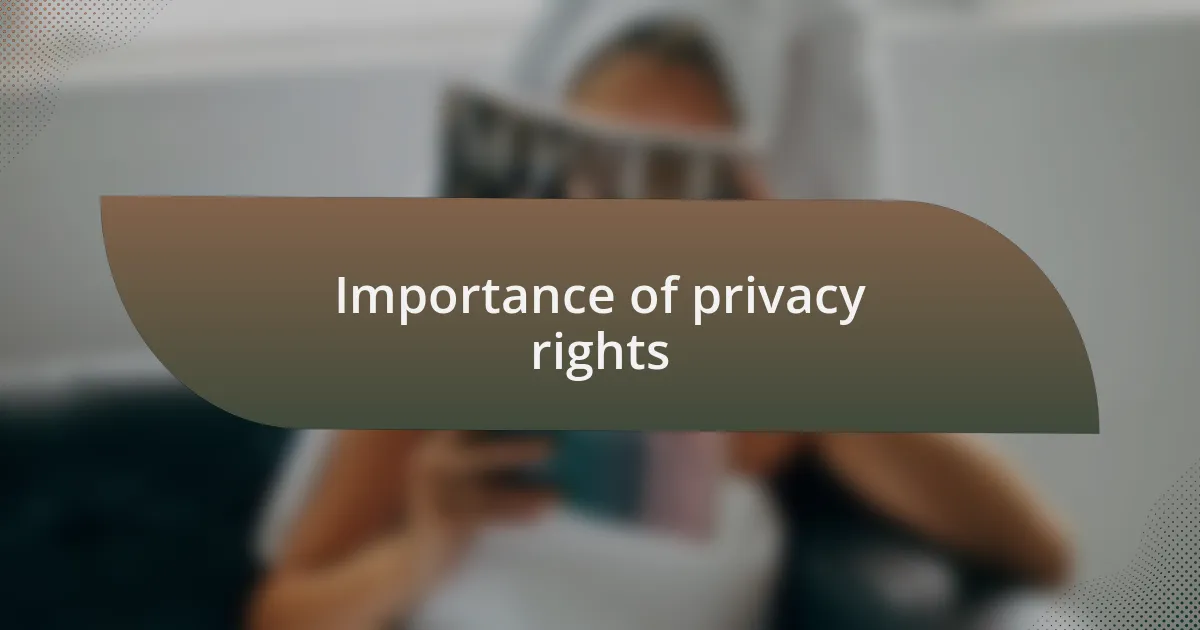
Importance of privacy rights
The importance of privacy rights cannot be overstated. I distinctly remember a conversation with a friend who felt exposed after realizing how much information apps collect without our consent. It struck me that this violation of privacy isn’t just an inconvenience; it’s a fundamental breach of trust, reminding us that our data is often treated as a commodity rather than a personal treasure.
Privacy rights serve as a safeguard against abuse, ensuring that individuals can control their narratives. I once sat in on a discussion about government surveillance, and it was chilling to hear firsthand accounts from those who had experienced intrusive monitoring. How can we truly feel free when our actions are being scrutinized without our knowledge? This thought haunts me and reinforces the necessity of advocating for robust privacy rights.
Ultimately, privacy rights are about dignity and autonomy. I think back to my own experiences applying for jobs, where I was often required to share personal information that felt irrelevant or excessive. Each time I handed over my data, I felt a slight loss of control. Are we really comfortable relinquishing that power? Upholding privacy rights means fostering a sense of security and respect in an increasingly interconnected world.
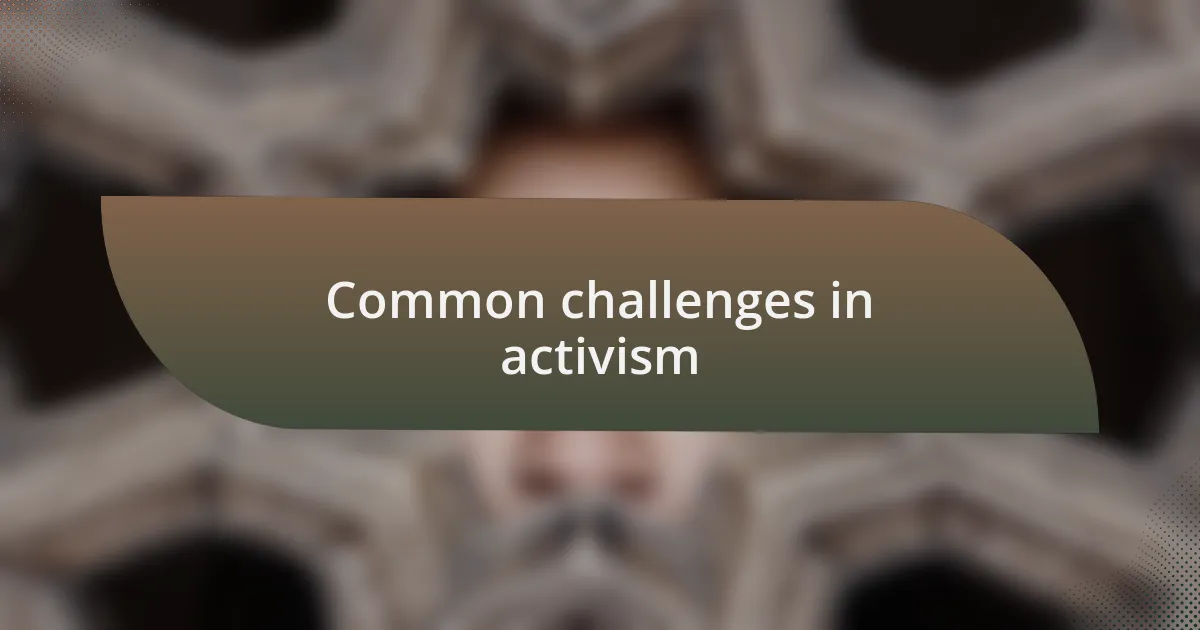
Common challenges in activism
Activism is a challenging path and can be riddled with various obstacles that test one’s resolve. One major challenge I faced was the overwhelming amount of information and misinformation that circulates, especially in the realm of privacy rights. During one campaign, I remember being bombarded with conflicting statistics and opinions, which made it difficult to focus my message and rally supporters. How do you effectively advocate when the noise around you drowns out your voice?
Another hurdle is the emotional toll activism can take. There were moments when I felt disheartened, like when I organized a local event only to see a minimal turnout. It made me question the impact of my efforts. I often wonder, is it worth the fight when it feels like progress is so slow? Yet deep down, I know that even small steps count in the larger journey towards change.
Finally, collaborating with others in activism can be both rewarding and frustrating. I’ve had experiences where differing priorities among team members led to conflicts, causing setbacks in our initiatives. I recall a heated discussion about strategy that left the atmosphere tense, and I had to remind myself that we’re all striving for the same goal. How can we bridge those gaps and work together effectively? A shared commitment to our mission can indeed help us navigate these challenges.
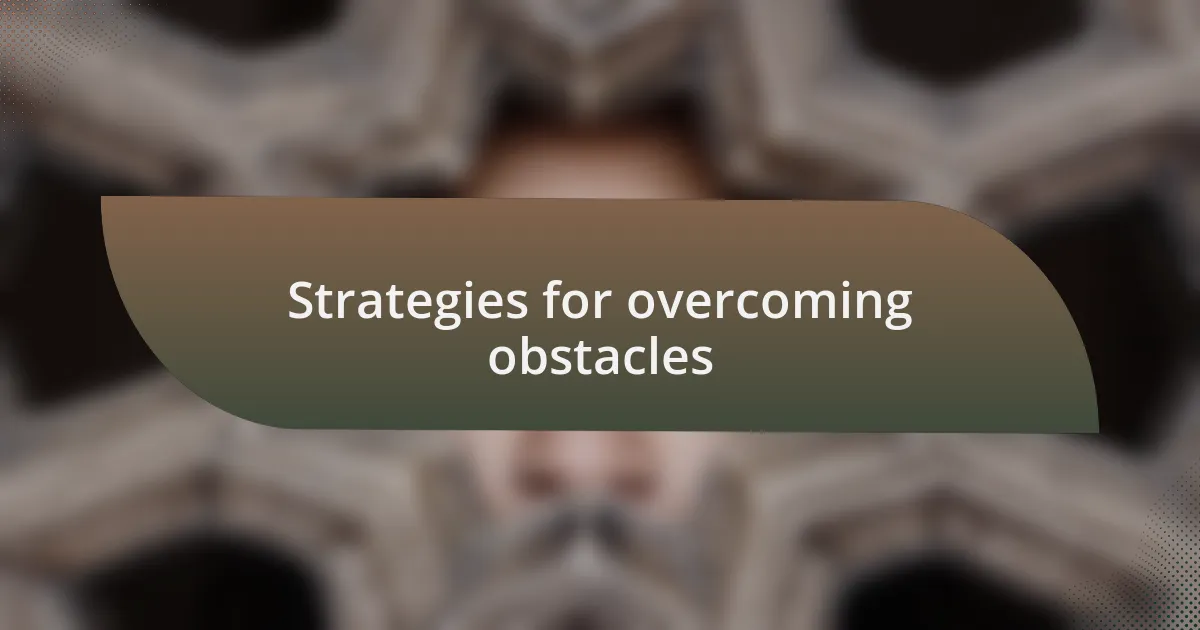
Strategies for overcoming obstacles
To tackle the overwhelming flood of information, I found it helpful to create a “fact-checking” buddy system with fellow activists. This collaboration not only helped to sift through the noise but also fortified our collective understanding. Have you considered pairing up with someone to verify data before addressing your audience? It really transformed how I approached my messaging, making it more focused and credible.
Emotional resilience is key in activism, especially when things don’t go as planned. On one occasion, after a particularly grueling campaign that felt like it had gone nowhere, I took a moment to reflect on the smaller victories we had achieved. It dawned on me then that each small win contributes to a larger cause, even if it sometimes feels invisible. Have you ever taken a step back to appreciate the incremental changes you’ve made? It can reignite your passion and refocus your energy for the long haul.
When navigating team dynamics, I learned that open communication is essential. During a project fraught with misalignment, I initiated regular check-ins to voice concerns and celebrate successes together. This small change significantly improved our cohesion and morale. What if we all made space for honest dialogue within our activist circles? It’s astounding how a little vulnerability can lead to stronger collaborations and renewed motivation.
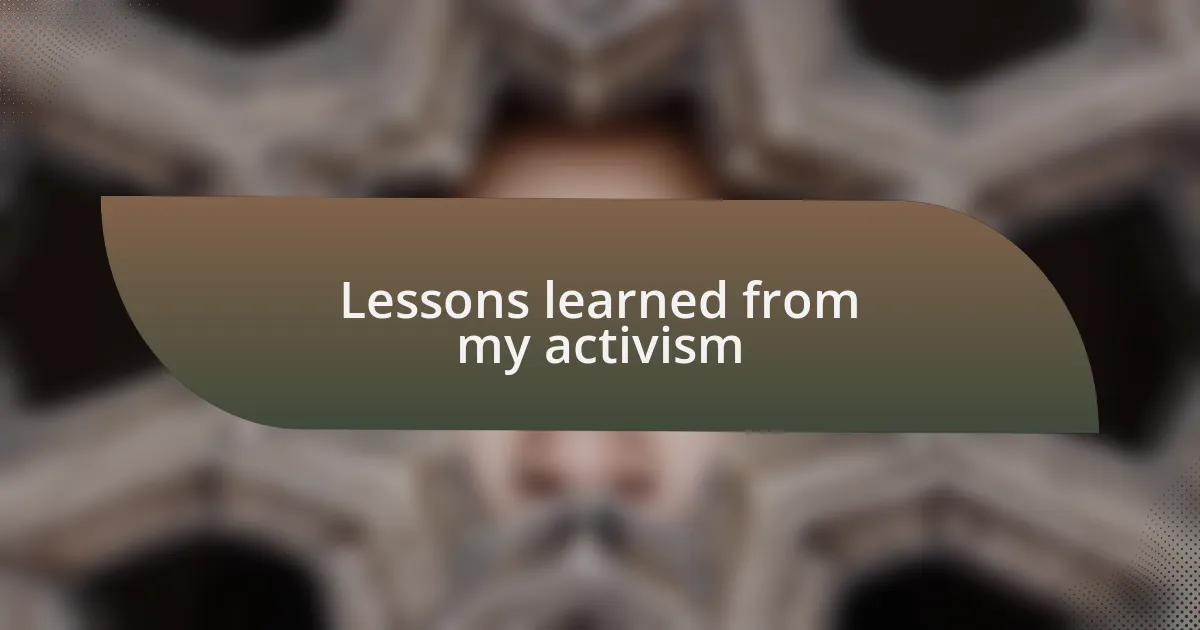
Lessons learned from my activism
One lesson I’ve learned through my activism journey is the importance of adaptability. I recall a time when a planned event faced a sudden venue cancellation. Instead of panicking, I quickly switched gears and organized an online seminar. This experience taught me that being flexible not only allows for quick problem-solving but also opens up innovative avenues for engagement. Have you ever been forced to pivot on a project? It’s strange how such moments can lead to unexpected successes.
Another significant insight is the power of storytelling in connecting with audiences. I remember sharing a personal story about my experience with privacy breaches, and how it resonated deeply with others. That connection sparked conversations and brought a community together. It reaffirmed my belief that our narratives—however vulnerable—can be powerful tools in advocacy. How often do you think we underestimate the impact of sharing our own stories?
Lastly, I’ve come to appreciate the importance of self-care in sustaining long-term activism. There was a phase when I was stretched too thin, juggling multiple projects while feeling the weight of the world. It led me to burnout, and I realized that taking time for myself was not a luxury but a necessity. How do you balance your passion for advocacy with your own well-being? Finding this balance has been crucial in allowing me to fight for privacy with renewed energy and enthusiasm.
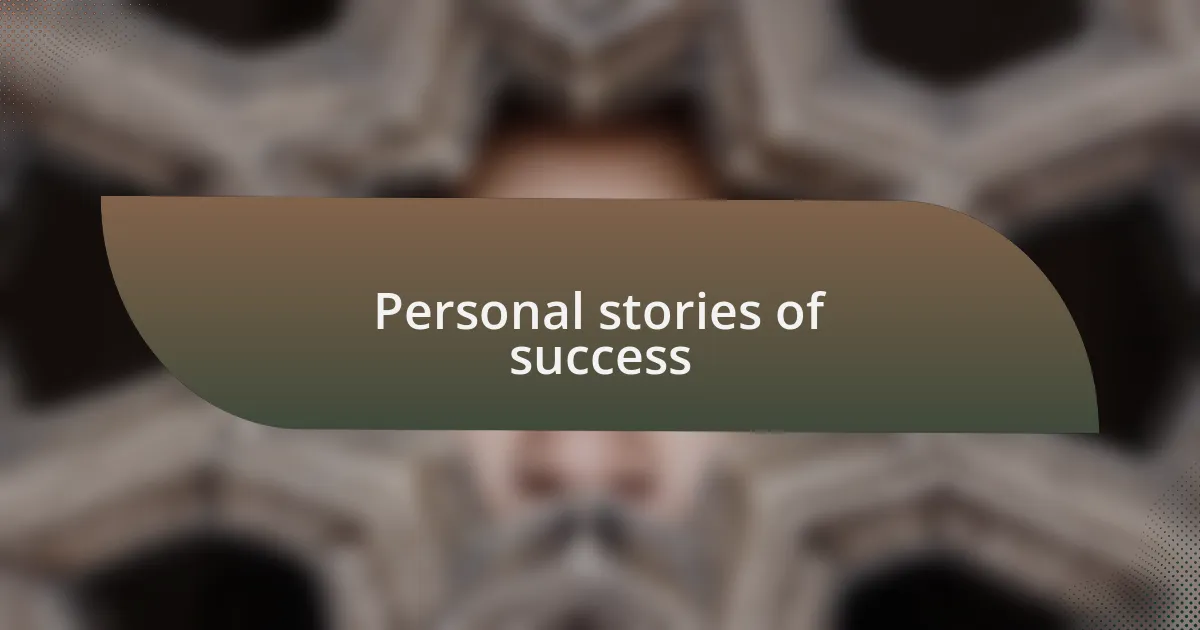
Personal stories of success
The journey I’ve taken in activism has had its victories, often when I least expected them. One memorable moment was when I led a local campaign to advocate for stronger data privacy regulations. After weeks of outreach efforts that initially seemed futile, I received an unexpected call from a local news outlet interested in our story. That exposure significantly boosted our campaign’s visibility, proving that perseverance can lead to the recognition we need to amplify our message. Have you ever felt like your efforts were going unnoticed, only to find out they had a ripple effect?
Another success came during a community workshop I organized on digital rights. Initially, attendance was sparse, but one participant later shared how the workshop empowered them to advocate for their own privacy rights in their workplace. This reminded me that even small gatherings can create a significant impact if we foster genuine connections. It makes me wonder—how many powerful changes can begin in intimate settings?
Reflecting on these moments, I am constantly reminded of the strength found in collective action. I recall collaborating with a group of dedicated activists who shared their skills and resources, leading to a successful petition that garnered thousands of signatures. In our diverse strengths, we found unity and purpose, proving that together we can create a powerful force for change. Have you experienced the transformative power of collaboration in your activism? It’s a powerful reminder of what we can achieve when we stand together.
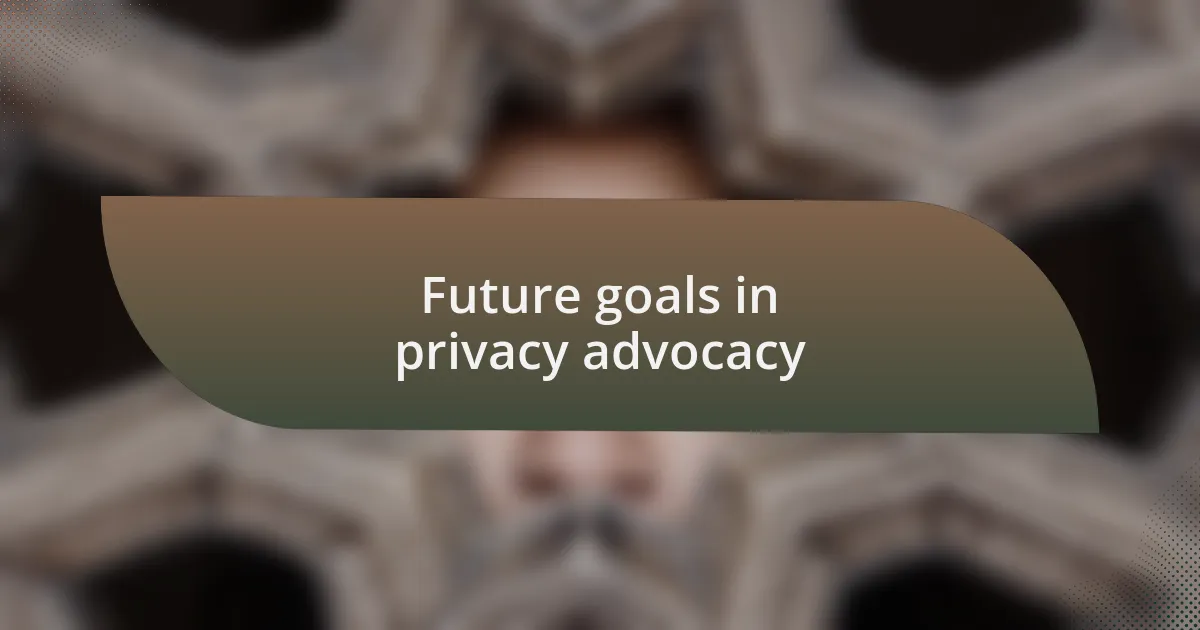
Future goals in privacy advocacy
As I look to the future of privacy advocacy, one of my primary goals is to create more inclusive spaces for underrepresented voices in the conversation. I vividly recall a community meeting where a young activist shared their challenges navigating privacy issues in marginalized communities. Their courage to speak out reinforced my belief that everyone deserves a platform. Shouldn’t we all work toward amplifying these vital perspectives?
Additionally, I want to focus on strengthening collaborations with tech companies to promote transparency in their data practices. I’ve had encounters where developers were genuinely surprised to learn about the implications of their work on user privacy. This made me realize that open dialogues can lead to meaningful changes. What if more advocates engaged developers directly to promote a culture of privacy from the ground up?
Finally, I’m passionate about leveraging educational initiatives to raise awareness about privacy rights, especially among youth. I remember a workshop where high school students were stunned to learn how much data they unknowingly share online. Their engagement sparked a real curiosity to change their habits and inform their peers. How can we capitalize on that enthusiasm to foster a generation of informed digital citizens?